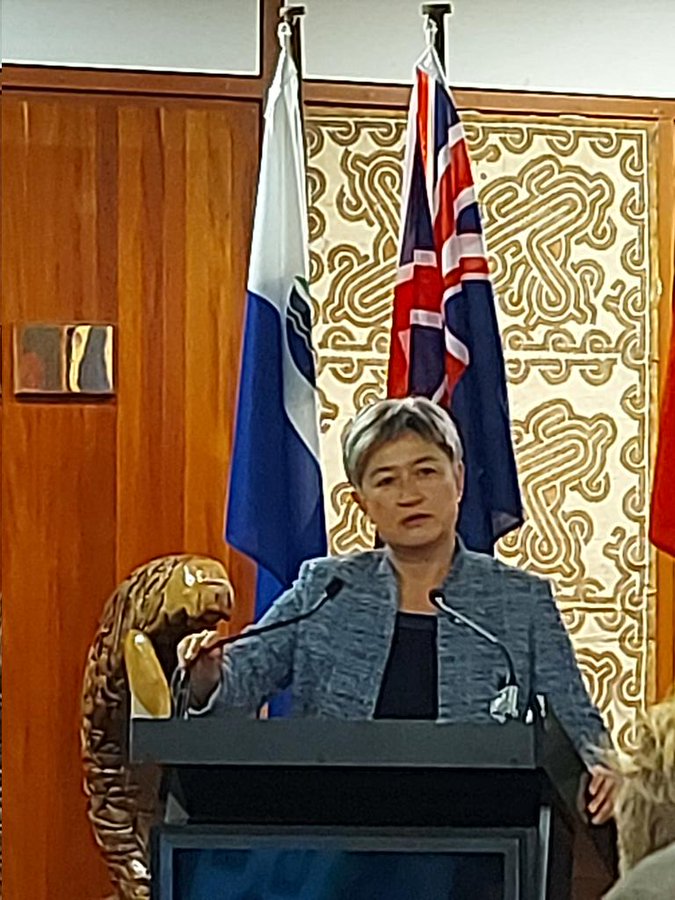The new Australian foreign affairs minister, Penny Wong, has promised to treat Pacific island countries with respect, telling an audience in Fiji that Australia is “a partner that won’t come with strings attached, nor impose unsustainable financial burdens”.
Wong promised to “respect Pacific priorities and Pacific institutions” and set out an implicit contrast with China, which is pursuing a sweeping regional economic security deal with Pacific nations that would dramatically expand its influence and reach into those countries.
In her first trip to the Pacific since being sworn in as foreign affairs minister, Wong also said Australia under past governments had “neglected its responsibility to act on climate change” and showed disrespect to Pacific nations – but she wanted to “assure you that we have heard you”.
Wong said the election on Saturday showed “a huge groundswell of support for taking real action on the climate crisis in Australia” and she committed to enshrining the new stronger 2030 target in Australian law.
“This is a different Australian government and a different Australia,” she said in a speech to the Pacific Islands Forum secretariat in Suva, Fiji.
“We will stand shoulder to shoulder with you, our Pacific family, in response to this crisis.”
Wong said she had travelled to Fiji in her first week in office “to make clear on behalf of the new Australian government – and in particular on behalf of prime minister [Anthony] Albanese – our commitment to you”.
“We will listen. We will hear you – your ideas for how we can face our shared challenges and achieve our shared aspirations together,” she said in a speech titled A New Era in Australian Engagement in the Pacific.
In a nod to the growing strategic competition in the Pacific, Wong said the region had “not faced a more vexing set of circumstances for decades”.
Wong said Australia would “draw on all elements of our relationships to achieve our shared interests in building a stable and prosperous region, where rules and sovereignty are respected”.
“The triple challenges of climate, Covid and strategic contest will challenge us in new ways,” she said.
“We understand that the security of any one Pacific family member rests on security for all. We have a collective responsibility as we face these challenges to secure our region’s interests today and in the future.”
Wong said she committed to working with, and listening to, this generation of Pacific leaders to navigate the challenges together.
She said Australia would remain a critical development partner for the Pacific family in the years ahead, and “contribute to the long-term stability and security of the Pacific”.
Wong’s trip comes as China proposes a regional deal with 10 Pacific island nations.
The agreement will be discussed by Pacific leaders and Chinese foreign minister Wang Yi, who has embarked on a marathon tour of the Pacific, visiting eight countries in 10 days. He met with his Solomon Islands counterpart on Thursday.
A draft of the deal, written in a similar style to the controversial bilateral security deal signed by Solomon Islands and China last month, and a five-year action plan, both of which have been obtained by the Guardian, cover a huge range of issues, including trade, financing and investment, tourism, public health and Covid-19 support, establishing Chinese language and cultural exchanges, training and scholarships, as well disaster prevention and relief.
A key focus of the proposed deal is China’s involvement in Pacific security.
The arrangement would see a dramatic expansion of China’s engagement with policing in the region, with the draft deal proposing to “expand law enforcement cooperation, jointly combat transnational crime and establish a dialogue mechanism on law enforcement capacity and police cooperation”.
It puts a significant focus on China training Pacific police forces, something it is already involved in across the region, with China proposing to hold “intermediate and high-level police training” for Pacific island countries and as a matter of urgency to “hold the first China-Pacific Islands Countries ministerial dialogue on law enforcement capacity and police cooperation” later this year, as well as helping to construct laboratories for fingerprint testing, forensic autopsy, drugs, electronic and digital forensics.
China is hoping the deal will be signed by 10 Pacific countries in Fiji next week when Wang hosts the second China-Pacific foreign ministers meeting.
Without directly mentioning China, Wong set out Australia’s case.
“We are a partner that won’t come with strings attached, nor impose unsustainable financial burdens,” the Australian foreign affairs minister said.
“We are a partner that won’t erode Pacific priorities or institutions.
“Instead we believe in transparency. We believe in true partnerships. We will respect Pacific priorities and Pacific institutions. We will support growth and development that is sustainable.”
She noted that Australia would increase its overseas development assistance to the Pacific by $525m(US$372 million) over the next four years, “working with you to recover from the pandemic”.
“I’ve come here in my first week as foreign minister because I wanted to say, in person, in the Pacific, on behalf of the new Australian government, how deeply we value being part of our Pacific family,” she said.
“And to our Pacific brothers and sisters – I want to say thank you. Thank you for your stewardship of our shared blue Pacific and its amazing biodiversity.
“Thank you for being custodians of some of the planet’s most ancient cultures, and many of the world’s languages.
“We feel a profound sense of kinship with the Pacific, of wanting to connect with the Pacific as part of one family.”
Wong stressed the importance of working together.
“As fellow members of the Pacific family, our security and prosperity are truly things we achieve together, or not at all,” she said.
“Like any family, when we listen, when we understand each other’s concerns, when we act in partnership together – we will succeed.”
SOURCE: THE GUARDIAN/PACNEWS














